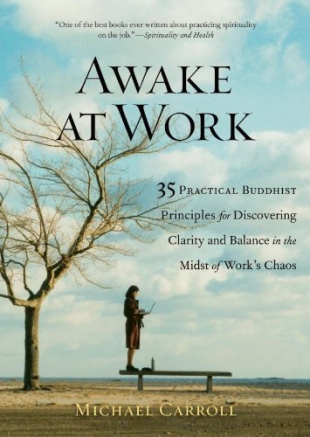When people are asked for words to describe their jobs, the ones most used are "stressful," "difficult," "discouraging," and "frustrating." For many, work is unfulfilling and viewed as a war zone, drudgery, addiction, inconvenience, or problem.
Michael Carroll is a Buddhist meditation teacher who had a 32-year career on Wall Street and then in publishing. He is the founding director of Awake at Work, a consulting group that helps organizations and individuals discover balance and well-being in the midst of everyday labors. In this immensely practical book, he presents 35 principles inspired by a classical Tibetan Buddhist text, The Root Text of the Seven Points of Training the Mind, and its transformative spiritual practice of using slogans called lojong. These handy sayings have been used for over a thousand years to train the mind and enable people to reconnect with their inner wisdom, clarity, purposefulness, and authenticity.
Whatever your career path, this meditative work will inspire you to reframe many of your activities at the office or on the road. "In our impatience to succeed and become better, faster, and more profitable," Carroll writes, "we overlook the fact that work, with all its pressures and problems, is encouraging us to be engaged, resourceful, and alive — right here and right now."
The author begins with four core slogans: balance the two efforts (let go and be available to what is presenting itself), be authentic, cultivate li (the Chinese quality of civility or kindness), and work is a mess. The last encourages us to accept that we will probably never get it all together; we need to just accept the chaos, interruptions, and roadblocks, and adapt to them with good cheer.
According to Carroll, more than 1,000 Americans lose their jobs every hour, and many people are constantly frightened by that prospect. By regularly pondering the slogan "your present job is going away," you can give up the illusion of security. It is also helpful to "contemplate wealth" by taking a hard look at your attitudes toward money and what gives you contentment. "Be grateful to everyone" points out that even difficult people at work can be your spiritual teachers. "Welcome the tyrant" challenges us all to look at how we project our rage onto others instead of standing up for what we believe when facing an unwelcome decision from an authority figure.
Carroll wisely calls these slogans "smelling salts that we apply in order to wake us up at work." This book applies the well-tried wisdom of Tibetan Buddhism to the daily grind, providing a set of strategies that you can turn to when you're having a hard day at the office and need to regain your confidence, balance, resiliency, and playfulness.
